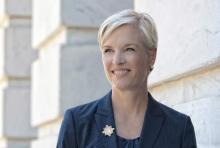The American Congress of Obstetricians and Gynecologists is sounding the alarm about looming access to care problems if states are able to remove Planned Parenthood clinics and affiliates from their Medicaid programs.
“Preventing health centers affiliated with Planned Parenthood from treating women in Texas or other states, will, without question, keep women from getting important preventative care and screening services,” Dr. Hal C. Lawrence III, executive vice president and CEO of the American Congress of Obstetricians and Gynecologists, said during a Nov. 23 press conference. “We are already confronting challenges to care for Medicaid patients. Across the country, Medicaid programs have reported provider shortages. … Now is the time to look at ways to improve how we serve Medicaid patients, not to make it even harder for them to find a doctor by removing so many health centers from the program.”
In recent months, lawmakers across the country have voted to defund Planned Parenthood clinics and their affiliates largely in response to controversial hidden camera videos released over the summer that purportedly show Planned Parenthood officials discussing the collection of fetal tissue. Critics say the videos show that Planned Parenthood is illegally profitting from the sale of fetal tissue, but Planned Parenthood has denied that claim and in October announced that they would stop accepting reimbursement for expenses associated with fetal tissue collection and donation.
Ohio is the latest state to move toward defunding Planned Parenthood. On Nov. 17, the Ohio House of Representatives passed a bill that would block state and federal money from reaching Planned Parenthood clinics. The legislation would redirect state-administered grants – about $1.3 million – to federally qualified health centers, health departments, and other health centers that do not perform elective abortions or contract with organizations that provide such services. Gov. John Kasich (R), who is also a candidate for president, has indicated support for the bill.
Earlier this year, Louisiana Gov. Bobby Jindal (R) moved to strip Medicaid funding from Planned Parenthood clinics in his state. A federal judge temporarily halted the payment ban on Oct. 29.
And federal courts have blocked similar efforts to remove Planned Parenthood affiliates from state Medicaid programs in Alabama, Arkansas, and Utah.
Meanwhile, Planned Parenthood of Greater Texas sued the state’s Health and Human Services Commission on Nov. 23 after Gov. Greg Abbott (R) axed Medicaid funding from the health provider in late October.
Three days after the state announced plans to end Medicaid contracts for Planned Parenthood affiliates in Texas, state officials raided health centers in Houston, Dallas, San Antonio, and Brownsville with orders to turn over patient and employee records, according to the complaint. Government investigators would not discuss the investigation with the media.
In the Texas lawsuit, Planned Parenthood argues the state’s attempts to terminate its provider agreement with Medicaid violates federal law because it prevents Medicaid-enrolled patients from obtaining care from their provider of choice.
“We have seen the very real and very devastating consequences for Texas women when politicians block access to care at Planned Parenthood, with tens of thousands going without access to birth control, HIV tests, and cancer screenings,” Cecile Richards, president of the Planned Parenthood Federation of America said in a statement. “Texas is a cautionary tale for the whole nation – with politicians in Arkansas, Alabama, Ohio, and Louisiana trying to do the very same thing. Taken together, these measures threaten to devastate access to critical health care and education across vast regions of the country – all in the name of politics.”
A spokesman for the Texas Health and Human Services Commission declined to comment, stating that the commission does not discuss pending litigation. In an Oct. 19 notice of Medicaid termination sent to Planned Parenthood affiliates, Texas Inspector General Stuart W. Bowen Jr. wrote the state had determined that the group was “no longer capable of performing medical services in a professionally competent, safe, legal, and ethical manner.”
Texas – and it’s approach to regulating abortion – will be in the national spotlight in 2016 as the U.S. Supreme Court takes up the case of Whole Woman’s Health v. Cole, which challenges a state law setting strict requirements for abortion facilities. If the Texas law is upheld, about 75% of women’s health clinics that provide abortion would be forced to close, according to the Center for Reproductive Rights. A decision is expected in June 2016.
On Twitter @legal_med



